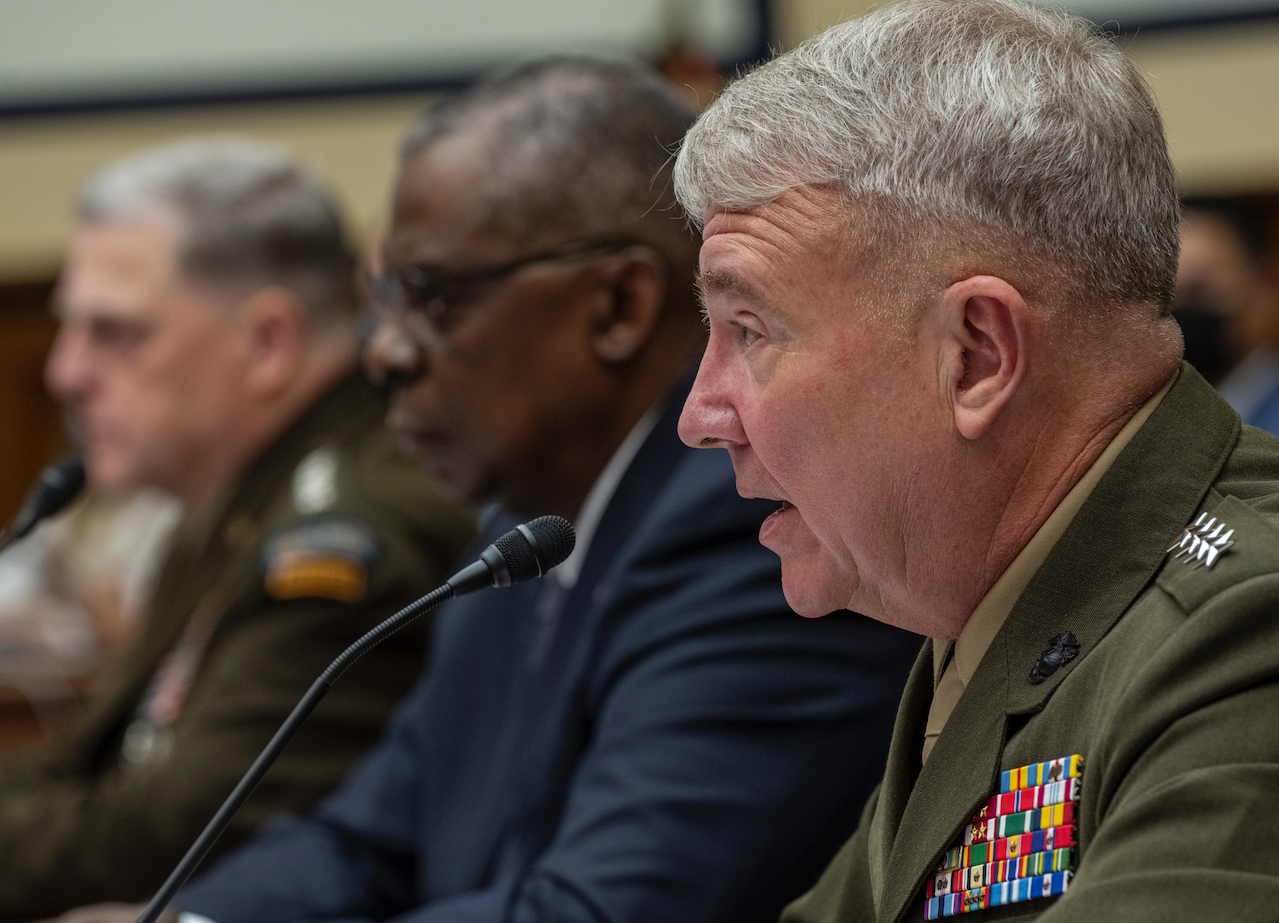
The sprawling size of the U.S. airbase at Bagram and its isolation from Kabul meant that keeping it under American control was “untenable under the situation” once President Joe Biden ordered all U.S. forces out of Afghanistan, U.S. Central Command’s top officer told a House panel Wednesday.
Marine Corps Gen. Kenneth McKenzie said, “the Bagram option [for use later in a large-scale evacuation of civilians] went away” without an order to send in up to 5,000 more American troops to back up the 650 left behind to defend the embassy in Kabul and retake the airbase.
“I did not see any tactical utility” to holding Bagram, he said before the House Armed Services Committee.
“We did this in close coordination with our allies and partners. Every departure of every element was carefully synchronized across the coalition and with our Afghan partners. On no occasion were they caught unaware by our movements; every base was handed off to Afghan forces according to a mutually understood plan.”
He said that among the command’s plans for withdrawal was the possibility of the collapse of the Afghan government and its security forces if no American and coalition forces and contractors were left behind.
McKenzie said the concern over the collapse of the Afghan government was expressed to the president.
Defense Secretary Lloyd Austin said remaining at Bagram “meant staying at war in Afghanistan.” He added, “there was no risk-free status quo option” of staying in the country after the announced withdrawal date.
To stay into September could have meant committing up to 25,000 more American service members to reopen bases and retake Kabul from the Taliban, said Army Gen. Mark Milley, the chairman of the Joint Chiefs of Staff. He added it was always the intention to evacuate the civilians through Hamid Karzai International Airport in Kabul and not use Bagram.
As he told the Senate Armed Services Committee Tuesday, Milley called the 20-year war in Afghanistan “a strategic failure.” The war “wasn’t lost in 20 days or 20 months.”
Time and again during the unusually contentious hearing, Republican members accused Biden of lying about receiving advice from his senior military officers about forces remaining in Afghanistan. Many of them use their five minutes for speeches, leaving no time for the witnesses to respond.
In his opening statement, HASC ranking member Rep. Mike Rogers (R-Ala.) said, “I fear the president may be delusional” in deciding to pull all American forces from Afghanistan. Rogers cited the deaths of 13 service members killed in a suicide bombing attack at the airport’s Abbey Gate and the hundreds of Americans and Afghan allies who are still in the country after the evacuation formally ended Aug. 31 as evidence of an “unmitigated disaster.”
“To jump down the president’s throat because he actually had to make the decision in an impossible situation, I think does a grave disservice,” said Rep. Adam Smith (D-Wash.), the panel’s chairman. He said he was frustrated with Republicans for arguing U.S. troops should have stayed in Afghanistan without recognizing there would be American casualties. “There was no easy option here.”
Answering questions about the evacuation of civilians, Austin said one reason the movement of American citizens and Afghans who worked with coalition forces did not begin earlier was a request by President Ashraf Ghani, who said such a change would cause his government to collapse. Austin pledged several times to continue working with the State Department to help American citizens, green card holders and Afghans with special immigrant visas leave the country safely. He extended that pledge to include Afghan Air Force officers and crews who flew their aircraft to neighboring countries as the Taliban took control of the country.
On over-the-horizon intelligence-gathering, McKenzie said there was no agreement to base American unmanned aerial systems in nations that border Afghanistan. He said there were overflight arrangements over countries neighboring Afghanistan. Panel members questioned whether the agreements would hold over time and wanted to know how much actual time the drones would spend over Afghanistan after such long flights.
Milley, as he did before the Senate panel, defended his calls to his Chinese counterpart that President Donald Trump had no intention of launching a nuclear attack.
“I have the intelligence right here” that the Chinese believed an attack was planned, he said at one point during a heated exchange. The intelligence “was significant and concerning.” He termed the Chinese as being “very nervous” about Trump’s intentions as his administration was ending. Later, he clarified his Tuesday remarks before SASC and statements earlier in the HASC hearing: “I’m not going to tip off” any adversary about American operations.





